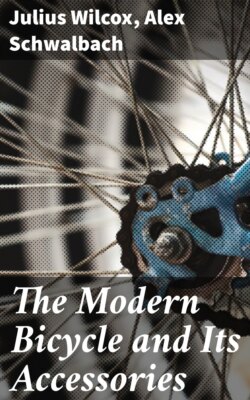Читать книгу The Modern Bicycle and Its Accessories - Julius Wilcox - Страница 43
На сайте Литреса книга снята с продажи.
SOME DEDUCTIONS.
ОглавлениеTable of Contents
Whatever peculiarities are involved in driving a bicycle by this method will be shared equally by the Dayton and the Featherstone, the change gear of the latter, of course, excepted; and what inconvenience may be found from lack of a step will pertain to both. The statement in the Featherstone catalogue, above quoted, that in case of breakage of the driving gear on one side the rider can continue his journey without trouble or delay by using the drivers on the remaining side was evidently made without having tried the experiment or having talked with a locomotive engineer about it. In any change of gear which shifts a pinion into or out of engagement with another, there is always liability to a shock or jar as the teeth of one slip into the spaces in the other, and this will occur whether the engaging pinion is moved directly forward in the same plane with the other or from one side. The shifting clutch on the Featherstone chainless probably resembles a pinion with only a single tooth, which tooth is to enter and catch in a single space. How far this clutch will be able to avoid the usual drawbacks of shifts in practice time must determine; we cannot speak from observation, for no specimen of the bicycle has come eastward as yet.
As illustrating the somewhat uncertain operation of change gears, an incident which occurred to a certain rider comes to mind. Some years ago he was convoying a small party over a country road, being himself mounted on a bicycle fitted with a “Hy-Lo” gear which he was testing. While climbing a hill and nearly at its top, the jolt by unexpectedly striking a brick caused his knee to hit the tripping device which governed the shift, and this moved the gear into midway position; the pedals then “became footrests,” and the bicycle began to back with its rider down the hill, pawing the air ineffectually with his feet, until he was landed in a blackberry bush at the bottom, greatly to the amusement of his companions and to his own discomfiture, as he had just been kindly “coaching” one of them as to the best way to overcome a grade. There may be some question, in general, as to whether changing gear at will might not, in practice, prove less desirable than we are all disposed to imagine, and for this reason: the learner finds the bicycle very fatiguing, partly from the nervous strain and partly because the muscles are put to a strange service; they become wonted to that service in time and cease to trouble, but if the gear ratio could be readily changed while riding (as theoretically seems desirable) the rhythm of pedalling might be so disturbed as to measurably bring back the original fatigue.
